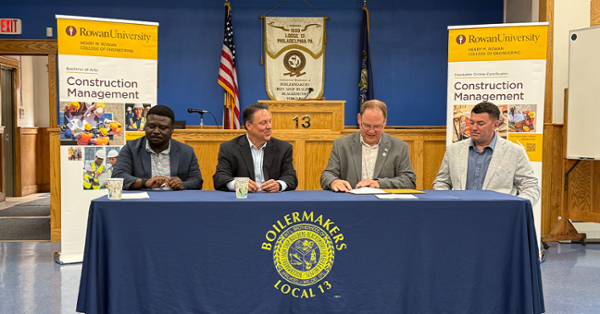Rowan University, Boilermakers Local 13 sign partnership to bring higher ed options to workforce
Rowan University, Boilermakers Local 13 sign partnership to bring higher ed options to workforce

Rowan University and union officials at Boilermakers Local 13 in Levittown, Pa., signed an agreement today establishing a path through which workers can take discounted coursework leading to stackable certificates and/or bachelor’s or master’s degrees in construction management.
Rowan Vice President for Academic Innovation and Strategic Partnerships David Coyner said those credentials, which students may earn at their own pace and on their own time through Rowan Online, can provide invaluable options for skilled workers.
“These programs were created to provide options for tradespeople, many of whom, as they advance in their careers, seek a management position,” Coyner said. “By offering these programs to complement apprenticeship training at a discounted rate through Rowan Online, we hope to increase access so they are both affordable and convenient to complete.”
The University’s construction trade programs include three stackable certificates of undergraduate study, two graduate certificates in engineering management, a Bachelor of Arts in construction management and the Master of Engineering Management degree.
The partnership with Boilermakers Local 13 builds on a growing relationship between Glassboro, N.J.-based Rowan and organized labor throughout the region.
In February, Rowan partnered with North America’s Building Trades Unions (NABTU) in an agreement that expanded career opportunities for members of 15 national labor organizations, 14 in the U.S. and one in Canada.
That agreement, formalized during a signing ceremony on Rowan’s Glassboro campus, establishes NABTU’s Building Trades Academy (BTA) at the University, creating a structure through which union members across North America can take professional development courses.
Union boilermakers are highly skilled and deeply trained individuals whose work is invaluable in construction, especially heavy industry. Their work involves assembling, erecting and maintaining boilers, furnaces, condensers, water towers and other key infrastructure pieces, often from blueprints and other technical materials.
Boilermakers 13 President Jim Jordan said the Rowan agreement will enable his members to pursue a variety of career options and advancement opportunities.
“We’re big believers in furthering our education and this is another step in that direction,” Jordan said. “There’s a big need not only for well-trained people in the trades but for people who can fill leadership positions. We already have a leadership curriculum, and this will make us that much more successful.”
He said Local 13 boilermakers, which complete a four-year apprenticeship program as part of their training, are highly skilled men and women whose work is vital throughout the construction and maintenance of industrial facilities like nuclear power plants, oil refineries and shipyards.
Boilermakers 13 Business Manager Brad Mickatavage said he expected a great response to the agreement within the local, which includes about 400 active members and some 65 apprentices.
“At any given point there could be 20-30 people or more who might be interested (in taking advantage of it),” Mickatavage said.
Rowan, whose operating pillars include a commitment to expanding access to affordable, high-quality education, within the past year also signed partnership agreements with the International Brotherhood of Electrical Workers (IBEW) 98 in Philadelphia and IBEW Local 102 in Parsippany.
Rowan Online is the University's web-based education portal. Undergraduate certificates offered through it are considered “stackable” because, as students complete one or more, they may apply earned credits to the next, higher-level program.
University Chancellor Tony Lowman said partnerships such as those forged with NABTU and the union locals support Rowan’s commitment to increase access to higher education and boost the economic impact of a well-educated workforce.
“We’re providing options,” Lowman said. “No longer will high school graduates have to choose between a college degree and a trade. You can have both.”